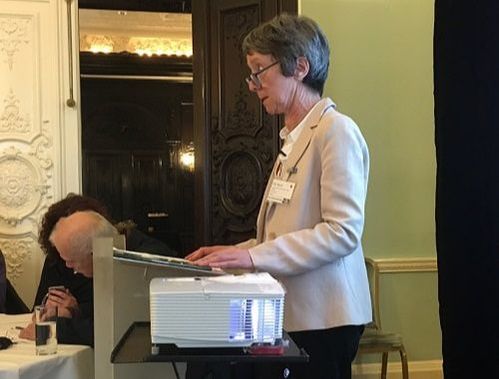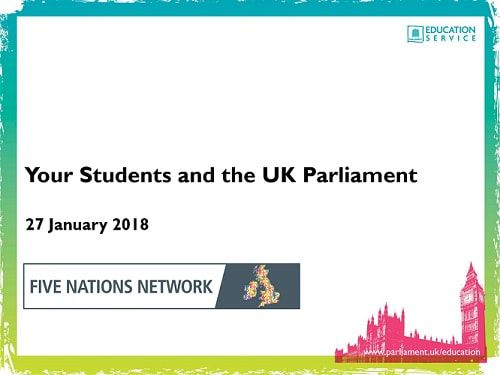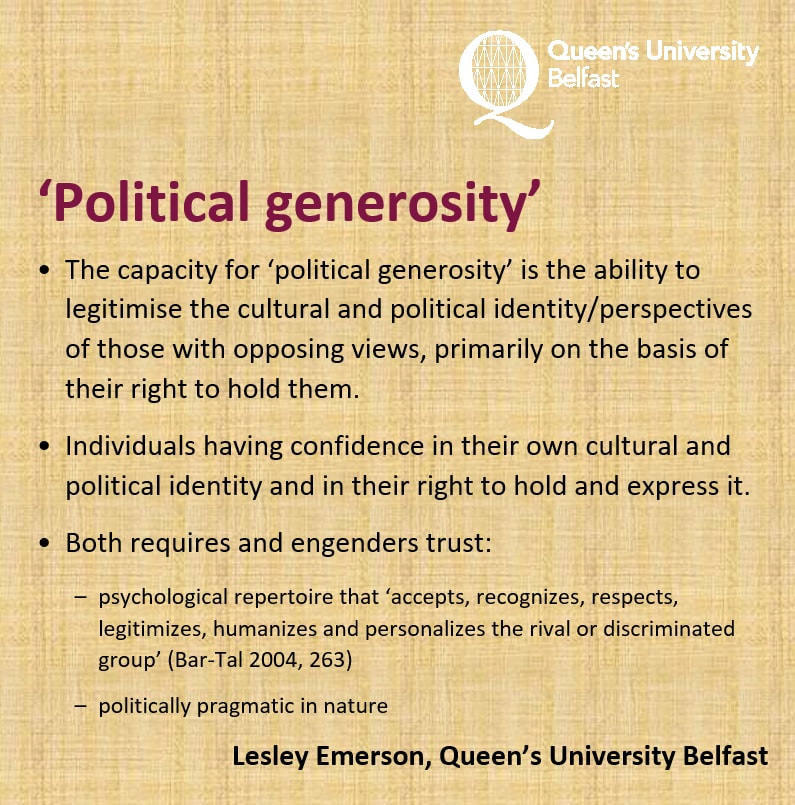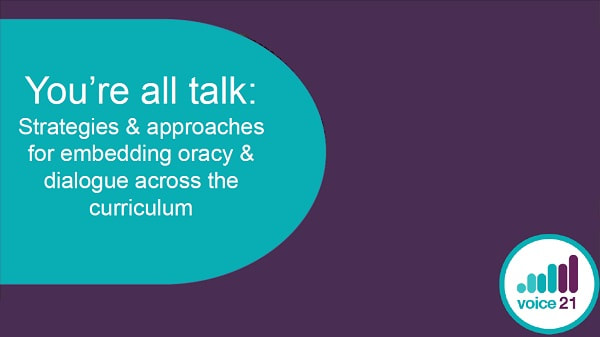- About
-
Conferences
- Publications
-
Funded Projects
- FNDPs 2019-20
- FNDPs 2017-18
- FNDPs 2016-17
- FNDPs 2015-16
-
Completed SSRIs
>
- Promoting Values and Citizenship through Human Rights Education
- Enabling Student Voice in the Classroom
- Campaign! Make an impact
- Promoting citizenship and values education in primary schools facing challenging socio-economic circumstances: an exploratory pilot
- Beyond Sectarianism - new thinking for a new generation
- Meeting the cross curricular challenge
- SSRI Awards >
- Citizenship
- Join
Keynote and session resources
Dr Eilís Ward delivered the opening keynote for the conference. The English-Speaking Union and Parliament's Education Service led plenary sessions and, on the second day, a series of four workshops were provided from participants across the five nations.
|
Democratic Deliberation: Inside and Outside
Dr Eilís Ward, School of Political Science and Sociology, National University of Ireland Galway, Ireland Eilís wrote a framework for a proposed senior cycle curriculum called ‘Citizenship Studies’, produced by the Curriculum Development Unit of the City of Dublin Vocational Education Committee (CDVEC) in 2002 for reform of the senior cycle of the Irish second-level school system. Eilís teaches International Relations, gender related courses and a module on Buddhism and politics. She worked with the International Foundation for Electoral Systems on civic education projects in Central Asia. Download the keynote transcript |
English-Speaking Union – Plenary
Led by Leela Koenig
The session involved participants in a range of practical methods for placing oracy at the heart of teaching and learning around controversial topics, including:
Led by Leela Koenig
The session involved participants in a range of practical methods for placing oracy at the heart of teaching and learning around controversial topics, including:
- The importance of oracy skills for citizenship teaching – how can we use different forms of talk in the classroom to help students develop their ability to critically analyse the world around them?
- Games and activities that introduce oracy skills and get students talking – how can we bolster students’ oracy skills, and create an environment conducive to democratic talk?
- Discussion/debate formats for controversial topics – how do teachers’ strategies reflect and prepare students for ‘real world’ democratic talk, and the ways in which we engage with controversial, often complex political issues?
|
Your Students and the UK Parliament
Led by David Carr, UK Parliament’s Education and Engagement Service David leads teacher training for UK Parliament’s Education and Engagement Service, providing practical workshops and courses for senior leaders and teachers to help them develop their students’ understanding of Parliament and democracy. Download the presentation |
|
Developing 'Political Generosity' through Classroom Deliberation
Facilitated by Lesley Emerson, Centre for Children's Rights, Queen's University Belfast, Northern Ireland This workshop provided participants with the opportunity to experience a number of active classroom methodologies (such as deliberative discussions, socratic questioning and 'structured academic controversy') aimed at enhancing young people's ability to deliberate with others on issues relating to the politically complex worlds in which they live. In particular, participants explored how we can move our students from debate/discussion towards deliberation and, in particular, towards an understanding of the 'reasonableness' of perspectives outside their own world view. Participants were also introduced to the concept of 'political generosity' (a rights-based approach to political identity) which encourages young people to move beyond 'tolerance' to understanding and legitimising multiple perspectives. Participants were also provided with access to a wide range of practical resources to support deliberation in the classroom. Download the following documents accommpanying the workshop: |
|
You’re all talk… strategies & approaches for embedding critical oracy and dialogue across the curriculum
Facilitated by Beccy Earnshaw, Voice21, Stratford, England Based on the evidence from recent EEF (Education Endowment Fund) trials and case studies from UK schools, this workshop introduced strategies to develop oracy, deliberation and dialogue across the curriculum and throughout a school’s culture - enabling every child to find their voice. The session explored how to plan for purposeful talk, create meaningful contexts for deliberation, methods to encourage participation and engagement of all students, frameworks for identifying key competencies and skills for oracy and whole school approaches to dialogue and oracy. Participants left with research highlights, practical techniques, inspiration and a toolkit of resources. Download the presentation accompanying the workshop |
|
Using drama strategies to explore political issues
Facilitated by Abdul Shayek and Nicole May, FIO, Wales Using drama, theatre and spoken word, participants explored what local, national and global politics means to us, both on a day to day basis and on a deeper, more philosophical and ideological perspective. How does one link the personal with the events and issues which seem beyond our grasp on a day to day basis? Participants tried out drama strategies and discussed how they can use them in their teaching. Download the workshop plan |
Controversial issues
Facilitated by Henry Maitles, School of Education, University of the West of Scotland, Scotland
This session aimed to reaffirm why we think political literacy through controversial topics is important and, through recent research evidence, to consider the positive impact such learning has on values and attitudes of pupils in schools. Participants then examined a teaching approach from a pedagogical perspective discussing both the possible pitfalls and the best ways of using it in the classroom, drawing on experiences so far of different teachers. Download presentation 1 and presentation 2
Facilitated by Henry Maitles, School of Education, University of the West of Scotland, Scotland
This session aimed to reaffirm why we think political literacy through controversial topics is important and, through recent research evidence, to consider the positive impact such learning has on values and attitudes of pupils in schools. Participants then examined a teaching approach from a pedagogical perspective discussing both the possible pitfalls and the best ways of using it in the classroom, drawing on experiences so far of different teachers. Download presentation 1 and presentation 2
- About
-
Conferences
- Publications
-
Funded Projects
- FNDPs 2019-20
- FNDPs 2017-18
- FNDPs 2016-17
- FNDPs 2015-16
-
Completed SSRIs
>
- Promoting Values and Citizenship through Human Rights Education
- Enabling Student Voice in the Classroom
- Campaign! Make an impact
- Promoting citizenship and values education in primary schools facing challenging socio-economic circumstances: an exploratory pilot
- Beyond Sectarianism - new thinking for a new generation
- Meeting the cross curricular challenge
- SSRI Awards >
- Citizenship
- Join





